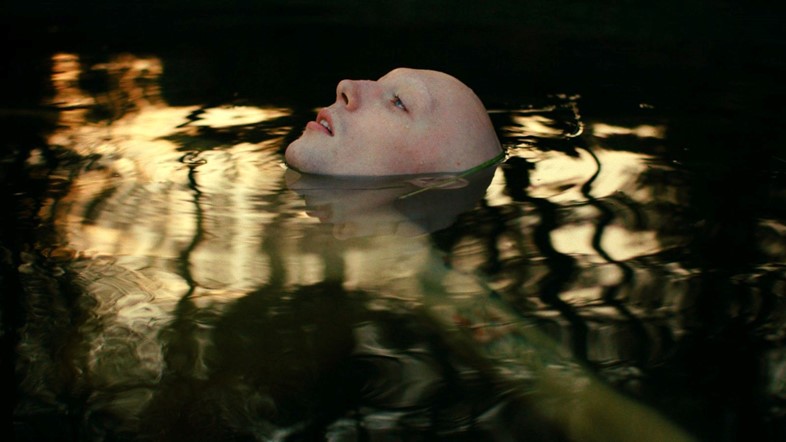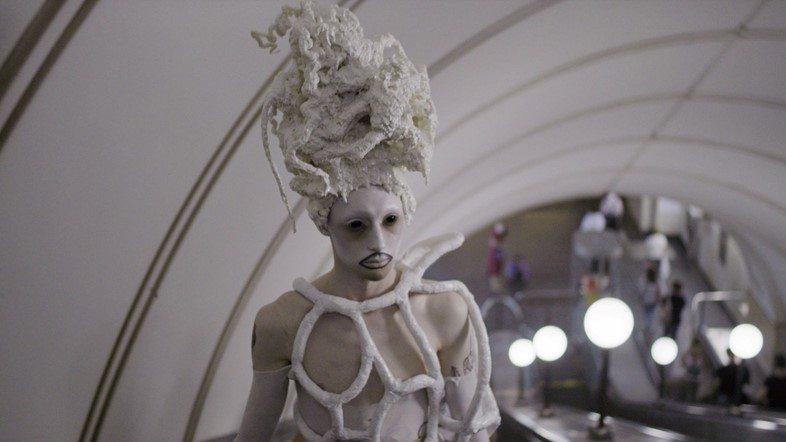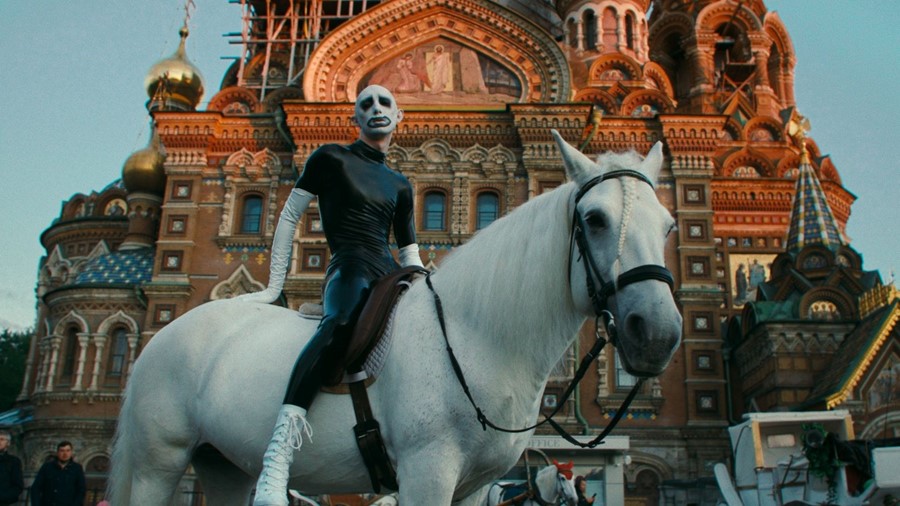As Queendom is released, director Agniia Galdanova discusses the film, which offers a powerful portrait of artist and activist Gena Marvin, set against the backdrop of “incredible” violence in Moscow
Magadan sits on a frozen bay in the far east of Russia, its sprawls of concrete apartment blocks embattled by biting winds, snow and temperatures that hit –30C. It’s an unforgiving landscape, geographically and socially; growing up, queer artist and activist Gena Marvin was a constant target of violence for her perceived difference. Today, that trauma fuels her extraordinary public performances that interrogate notions of beauty and queerness. Using reels of duct tape, papier mâché and discarded junk, she transforms herself into otherworldly “monsters” – a deathly-pale creature trailing tendril-like roots from its extremities; an alien cosmonaut on silver platforms skidding over the Magadan ice; or a cartoonish, marshamallow-y blob in heels, running on a treadmill. “My characters may seem scary,” she says in filmmaker Agniia Galdanova’s compelling documentary Queendom. “But the horrors I saw and experienced were much scarier than the costumes.”
Galdanova’s camera follows Marvin from the perils of her hometown and the baffled frustrations of her grandparents (her parents are both deceased) to the audacious, ephemeral performances she brings to even more hostile territory: in Moscow she teeters past mobs of vodka-soaked soldiers wearing a coiled rope and little else; wraps herself in the duct-taped colours of the Russian flag at an “unlawful” protest calling for the release of jailed opposition leader Alexei Navalny; and winds herself in barbed wire from neck to toe in protest against Russia’s war in Ukraine (for that, both Marvin and Galdanova were arrested). Honed down from 350 hours of footage, Queendom is a riveting portrait of ferocious courage, filled with moments of humour and heart-stopping grace.
On the eve of its release, the St Petersburg-born director shared the joys and dangers of chronicling her fearless subject, and how Marvin and her “monsters” made it out to a bittersweet new life in Paris.
Hannah Lack: How do you think growing up in Magadan shaped Gena?
Agniia Galdanova: Magadan is very harsh. It’s such a remote place. All the concentration camps were built during Stalin’s era and most of the people there are descendants of prisoners in the gulags, because there was a huge amount of prisoners in the whole region. People who grow up there have said it shapes you to be fearful. In Magadan, you can get beaten for dying a strand of your hair red – you don’t need to be queer and wear high heels and full makeup like Gena. It made Gena want to get out, to have freedom from this place, and from her grandparents. But I think it might have given her strengths too, to overcome all these difficulties. I so admire Gena for her way of seeing life – her bravery and also her humour. That’s why her TikTok videos are everywhere, why people make memes out of them.
HL: Gena stages a performance on Paratroopers’ Day in Moscow, a pretty volatile gathering of active and former soldiers – what was the atmosphere like that day?
AG: Well, that’s the moment I didn’t want Gena to go. It was very scary because these people are absolutely unpredictable – soldiers who get very, very drunk during the day in the city centre in this park in Moscow. The level of violence is absolutely incredible. In the end, the police didn’t allow us to enter the main park area – who knows how we would have ended up that day.
HL: What kind of precautions did you take setting out on those performances?
AG: Safety was the priority. When she called me about doing the Alexei Navalny protest, we thought through everything that could possibly happen: What if we get arrested? What if we get beaten? I would check with a lawyer about the consequences, but you can’t predict what’s going to happen. And I have to say, Gena never questioned whether we should do it or not. There were a couple times where I thought it was too dangerous but Gena was like, “OK, don’t come. I’m going anyway.” I wasn’t going to stay home!
I had the phone numbers to call if we were arrested, I always carried a backpack with scissors to cut the duct tape in Gena’s costumes, a change of clothing for Gena, our documents, our passports. We had to be inventive – filming the protest against the war in Ukraine, we put our cinematographer on roller skates, in case he needed to escape with the footage. And that’s exactly what happened – Gena and I got arrested, I gave our cinematographer a little sign it was time to go, and he just took off on skates.

HL: You intersperse the documentary with more dreamlike scenes of Gena’s performances – was that a way of capturing something of her inner world?
AG: My way of doing documentary is observational – but then we were filming Gena doing this performance wearing a mask with horns and I realised: this is treasure. As you said, it’s like Gena’s subconscious, it’s her kingdom. She creates her own world where she can go and feel safe to express her joy or her pain.
HL: How does she define her art?
AG: Every time she creates a “creature” as she calls them, it’s for one time only – she destroys everything afterwards. So it’s a one-day, living piece. I think it’s her reflection on what’s happening in the world, or inside of her. I really love the one when she crawled through the metro train carriage for example, looking like a snow queen but from your nightmares. Most of the time she says it’s her pain, and as she says, it may look scary, but everything that’s surrounding us right now is way scarier. So you shouldn’t be scared of her monsters.
HL: How do you think Gena changed over the course of your time together?
AG: When we met, I was researching a series on the drag scene in Russia – she wasn’t doing yet what you see in the film. We were at her flat one day and suddenly she started doing something with duct tape and rubbish she’d found on the street, and in a couple hours it turned into this creation I’d never seen before, with tails and huge horns ... I was lucky to meet an artist at the beginning of her journey, capture her growth and search for new art forms. She grew up in front of my eyes and today she’s mature and very strong.

HL: Gena is in Paris now. How is she adjusting to a new life outside of Russia?
AG: It’s strange, I filmed 350 hours of material and didn’t have an ending to the film. Nobody could have predicted Russia would launch a full-scale invasion in Ukraine. And in a twisted way it gave me the ending of the film – Gena got out to Paris. The first year was hard; she’d never been outside of her country before. But I’m amazed at how brave she is. She’s made friends, she’s learning English, she is working for different designers, she had an exhibition … Things are moving.
HL: It’s been a year since Russia’s parliament passed the laws banning ‘LGBT propaganda’, criminalising expressions of LGBTQ+ identity – what’s been the impact among your friends and community back home?
AG: It’s terrible. Most of our friends have left because it’s absolutely unbearable to stay in Russia and be open. You’re not even allowed to walk hand in hand on the street. And in terms of the trans law they adopted recently [banning gender changes], this is simply against humanity because you cannot get medication anymore, you cannot change your passport ... My nephew is a trans teenager who lives in St. Petersburg, and we’re trying to think of all possible ways to take him out because the level of homophobia is growing every day. There’s this very traditional view of how people should live in Russia and queer people do not fit into this frame.
HL: Can you imagine a way your film might be shown there?
AG: It’s complicated because of all the new laws Russia has adopted, but we’ll try to find a way. The idea was always to make this film for a Russian audience, for the young generation, to give them hope and let them know they’re not alone. My producer, Igor, also grew up in Magadan, and he said if he’d seen this film as a small gay boy, maybe he would have had a different childhood – he would have understood that he’s normal, he’s OK. But I also want an older generation to watch because it’s a universal story. When I’ve had Q&As around the world, people see their own families in the struggles between Gena and her grandparents. I was recently in South Korea and after the film, one old Korean man in the audience raised his arm and said just one thing – that the film was hard to watch because he realised he is essentially the grandfather of Gena. Just that one response from this Korean man – that is why I make movies.
Queendom is out in UK cinemas now.
